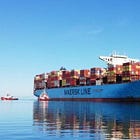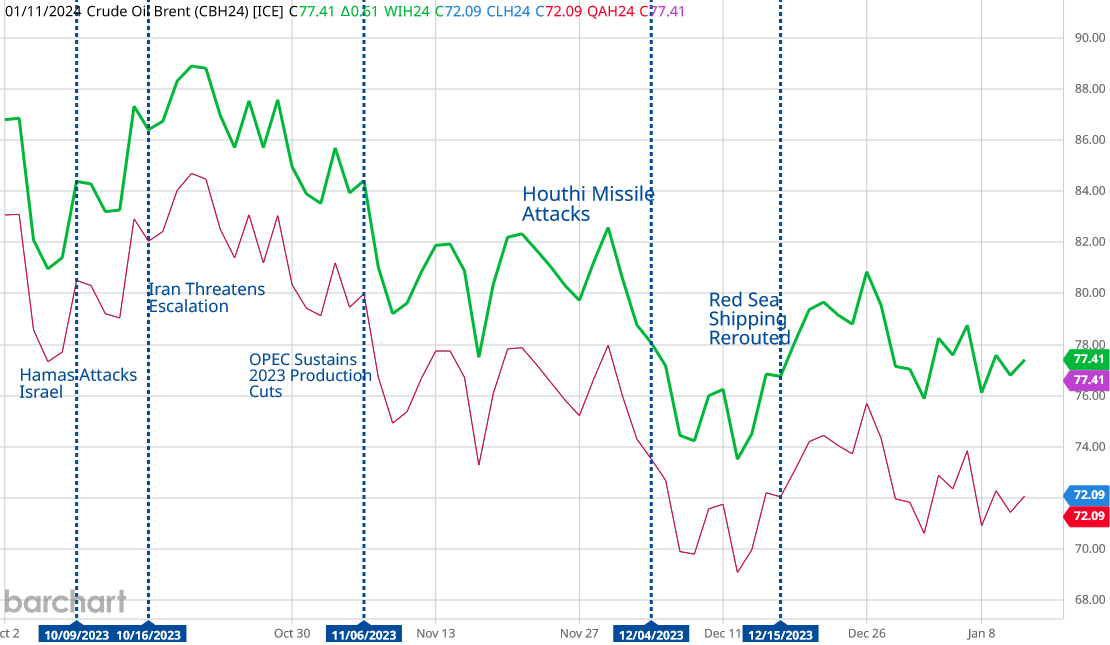Hamas v Israel: The US Strikes Back
Has The Inevitable Escalation Finally Happened?
What a difference a day makes.
Just yesterday, I contemplated how Iran’s efforts to widen the Israeli-Hamas conflict into a wider Middle Eastern war had largely failed.
If Iran has been attempting to force an expansion of the conflict between Israel and Hamas, that attempt has backfired on Iran bigly. What may even prove worse for Iran is that the backsplash from that attempt is hurting its allies Russia and China more than it is hurting the US and the EU.
Iran might very well be persisting in efforts to widen the scope of the Israeli-Hamas war. If that is the case, Iran is quite likely doing more harm to itself and its few allies than to Israel and the United States.
Today the United States and the United Kingdom struck Houthi targets in Yemen.
The U.S. and U.K. have begun striking targets in Yemen to retaliate for Houthi attacks in the Red Sea, a U.S. official confirmed to CBS News on Thursday night. The Iranian-backed Houthis have been launching barrages of drone and missile attacks in the Red Sea since soon after the Israel-Hamas war began.
Two signature events preceded the US and UK strikes. Yesterday, the Houthis launched their largest and most ambitious missile and drone attack on Red Sea shipping.
The US Navy shot down 21 Houthi missiles and drones launched from Yemen, according to a statement from US Central Command, in one of the largest Houthi attacks to take place in the Red Sea in recent months.
The military called it a “complex attack” carried out by the Iranian-backed militants.
The barrage, launched at about 9:15 p.m. Tuesday in Yemen, included 18 one-way attack drones, two anti-ship cruise missiles and one anti-ship ballistic missile, Central Command said. The attack was launched toward international shipping lanes in the southern Red Sea where “dozens” of merchant vessels were traveling, according to the statement.
Despite the large number of munitions used in the attack, no ships were reported damaged and no casualties have been reported.
The second event was Iran’s apparent seizure of an oil tanker in the Gulf of Oman as it set sail for Turkey in the Mediterranean.
Iranian forces have seized an oil tanker in the Gulf of Oman, two U.S. military officials confirmed to Fox News on Thursday.
The seized vessel, previously known as the Suez Rajan and now known as the Marshall Islands flagged oil tanker Saint Nicholas, was once at the center of another dispute between the U.S. and Iran that ultimately saw the U.S. seize over 1 million barrels of Iranian crude oil. Armed Iranian soldiers reportedly boarded the vessel Thursday morning.
In many respects, US retaliation against the Houthis was inevitable. The Houthi militias have been continuing to attack Red Sea shipping, and as of earlier today has launched a total of 27 missile and drone attacks on Red Sea vessels.
But perhaps more pressing is the Iranian seizure of the Saint Nicholas. That ship was not in the Red Sea but in the Gulf of Oman, which is outside the Strait of Hormuz that is the essential waterway for accessing the Persian Gulf.
This is a direct action by Iran against oil shipments leaving the Persian Gulf region, an area heretofore untouched by the Israeli-Hamas conflict. Moreover, this is direct involvement by Iran in these matters. Even the Houthi attacks in the Red Sea, although likely ordered by Iran, have left Iran with a plausible deniability. No such deniability exists for the tanker seizure. Iran is indisputably taking action against Persian Gulf shipping, and that is a direct threat on oil shipments from the region.
As of market close today, oil prices had not really shifted that much, and the larger macro trend in oil is still down.
However, word of the Iranian tanker seizure and US/UK strikes on Houthi bases in Yemen likely came too late in the day for the markets to react yet. Tomorrow we shall get a glimps of how much significance Wall Street attaches to these events.
Oil prices are sure to trend up somewhat at least. How much of a rise we see tomorrow will be the tell how disruptive Wall Street views these events.
We are moving from rumors of war to war. Very likely the United States will soon have troops embroiled in yet another Middle Eastern conflict—legal or otherwise.
Will this be World War 3? Not yet—but there is no denying the escalation moves us closer to that point.







1) Thank you for map of the Gulfs. No news outlet includes maps with stories anymore, and having to use more than one window will always annoy (almost as much as motion on the reading page).
2) Does anyone else find it strange that the U.S. seized (and took oil from, I believe) this same ship. it sure smells...fish-oily (sorry, I couldn't resist).
I’m trying to read between the lines regarding these actions. About the US shooting down Houthi drones - is this pure defense, or a warning show-of-force, or serious escalation of war? Have the US and UK militaries coordinated these moves, or are their actions independent? Because if it’s a coordinated campaign, that signals war escalation, to my mind. I know you like to stick to just the facts, Mr. Kust, but with your military background, do you have any guesses on what might come next?